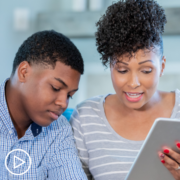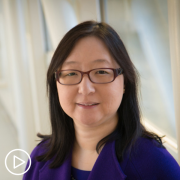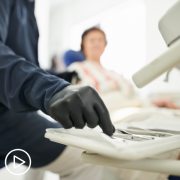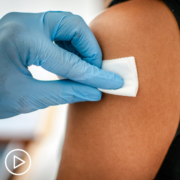MPN Caregivers: How to Provide Support During Appointments
MPN Caregivers: How to Provide Support During Appointments from Patient Empowerment Network on Vimeo.
How can myeloproliferative neoplasm (MPN) caregivers provide support during office visits? Dr. Naveen Pemmaraju shares key advice for caregivers to help improve and increase communication with healthcare providers for the sake of their loved one.
Dr. Naveen Pemmaraju is Director of the Blastic Plasmacytoid Dendritic Cell Neoplasm (BPDCN) Program in the Department of Leukemia at The University of Texas MD Anderson Cancer Center. Learn more about Dr. Pemmaraju, here.
Related Programs:
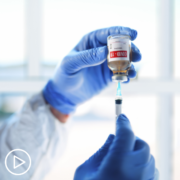
Is the COVID-19 Vaccine Safe and Effective for MPN Patients? |

|

What Are the Considerations When Choosing Myelofibrosis Therapy? |
Transcript:
Katherine Banwell:
Well, we have another audience question. This one is from Richard. He wants to know what advice do you have for caregivers, and how can he be supportive during appointments?
Dr. Pemmaraju:
Yeah. Richard’s question really is so important. Really, before the pandemic and now with the pandemic this extended time, this is the most important question that’s coming up. This is a challenge. I think a lot of our patients who are older, frail, live alone, they don’t even have the option to do that. That may be 25 percent of our patients right there,
And that’s very heartbreaking and difficult, and clearly, their care – it may not be compromised, but it’s certainly limited in some ways without getting that other perspective. Right? So, I think that’s important.
Now, out of the 75 percent of the people who may have someone that can be a part of their life, a lot of these folks, Katherine, are limited because of the pandemic. Most hospitals, smartly, I think, still have restrictions on not allowing every single person in the building just for health and safety protocols. So, telehealth has had to be a substitute, I would say, for that, and in a lot of cases, has been helpful. In some cases, frustrating, obviously, with technical difficulties, etcetera, etcetera.
I would say that the key is – and I really want this to be very specific. It would be easy to just say, “Yep, bring a loved one to your visit.” No, it’s not that easy, right? So, now, during the pandemic, I think two things are very important and what I’ve noticed. One is, if the patient is able to, if their health allows them to, prime the loved one or caregiver, “Hey, I’m going to be in the doctor’s office from this time.”
And I always say make it like the cable person visit, right? From 8:00 to 5:00. So, “Hey, today, on Tuesday, if you can have your cell phone on you, that would be nice, because I’m going to patch you in, and you can listen in the background.” This is actually a key pearl I can give to people. You’d be surprised how helpful that is. Because most people, if they’re not living in the same household or whatever – “Oh, I didn’t even know you were going to be – okay.”
Number two, when the loved one or caregiver is involved, which I encourage for everyone, try to discuss with them the night before, if your health allows you to, to go over some of the key questions. Say, “Hey, guess what? I only understand about 7 to 10 percent of what goes on in these visits, but I need you to ask this.” So, you can kind of prime your loved one to do that.
And then, lastly, you had mentioned earlier to have this list of questions. Well, that’s a great thing to give to the caregiver, right? So, if you’re able to use email and your family member is in California and you’re in Texas, maybe a quick email the night before.
“Hey, here’s what I’m thinking. In case I forget, will you ask this to the doctor?” A lot of these visits may only be five or 10 minutes, but you’d be surprised, if you have a list of two or three questions – boom, boom, boom – and then it’ll alleviate those worries there.
Lastly, I would also say don’t feel – I want to tell this to the viewers out there. Don’t feel pressured when you’re in the visit with us that you have to get every single thing out. And what I mean by that is now with email and the electronic medical record portal systems, there is some ability to contact people during – I’m sorry, after and between visits. So, maybe that might help you to not feel so much pressure in the visit.

